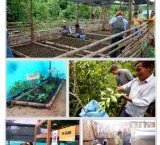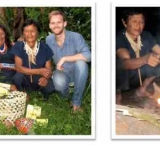Tyler Gage, co-founder and President, had spent the last 5 years working with indigenous communities in the Amazon creating Fair Trade initiatives and working on cultural preservation. Tyler has the unique ability to translate indigenous cultures' traditions, rituals and values into modern day life. And he does play a mean game of soccer, having been on the NCAA Div I top ranked soccer team at Brown (yes, Brown can excel in sports :) ). Dan MacCombie, co-founder and VP of Ops, has worked in conservation and public policy. Dan is also a photographer and scuba diver. He serves on the board of the Ostara Foundation which creates innovative models for sustainable development and community growth.
So you can go from the suburbs to the forest and blend both worlds (just like blending tea).
From these talents, experiences and strong passions, the guys created Runa. Runa is the first company to bring guayusa beverages to the USA. Guayusa is a very healthy leaf grown in the Amazon: high in antioxidants, vitamins, amino acids and caffeine. Unlike green and black teas or yerba mate, guayusa has no tannins so it has a smooth rich taste with the bitterness or astringency of other types of teas. Runa's products are specialty blended teas (bags and loose), energy drinks and soon, ready-to-drink bottles. Recently, Whole Foods signed to distribute Runa in their stores! The overall specialty tea and energy drink market is about a $14B market. The success of acai berries, from Brazil, shows how well this market is doing. Industry trends and studies project continued growth of healthy, 'green', exotic drinks.
Through Runa's Ecuadorian export company, Runatarpuna Exportadora S. A., Runa is working with hundreds of farmers, managing the only guayusa factory in the world which assures consistent product quality. They guarantee fair trade prices and agricultural assistance using non-traditional funding streams (e.g, development agencies, local governments, philanthropies). Runa as built significant barriers to entry in the supply chain with 5yr rolling contracts and deep local knowledge.
Their key strengths are:
1. first to market
2. strong, trusting relationships with the Ecuadorian government at national and local levels
3. strong, trusting relationships with the farmers, for whom they've provided a better way of life and
the likelihood of sustaining their way of life
4. long-term contracts
5. deep local knowledge of the Amazon, farming and socio-political environment
Runa started with 3 suburban kids with a passion for the outdoors (Tyler, Dan and Charlie) and experience in the Ecuadorian Amazon. While they loved working with the indigenous communities and helping them preserve their way of life, it was a particular ritual that captivated their attention and solidified the formation of Runa. The indigenous farmers with whom they stayed woke them at dawn to share in a morning ritual drinking guayusa together by dipping gourds into the large clay pot boiling over the communal fire. During these early morning hours, the communities share dreams, music and myths in a tradition they say makes them "Runa" - which means "person' or "fully living human being' in the Kichwa language. The students chose this name to represent their company's commitment to realizing a dream of living responsibly, collaboratively, and intelligently as a global community.
The students and indigenous farmers created a business that respects cultural traditions, supports small farmers, and helps the Amazon rainforest thrive. Runa inspires people to live a stimulating life and use their energy and imagination to create a better world.
“Runa” is a term of immense pride, identity, and spiritual vitality for the Kichwa people, but it's connotation in modern Ecuadorian society has become a derogatory racist term meaning “stupid and worthless.” The students want to regain indigenous cultural identity, traditions, and plant knowledge on an international scale by using Runa as the brand name for all their products and a symbol of their commitment to living fully as humans.
Plants and teas, have always served as central points of relationship between people, cultures, and lived environments. The students, Runa, believe that respectful sharing of goods, traditions, and knowledge is a natural and powerful way to grow sustainably as a global community.
UNESCO and Conservation International both recognize the Ecuadorian Amazon as one of the top 10 most biodiverse places on the planet. Each year, over 3% of the Ecuadorian Amazon is deforested. The oil mining industry has long legacy of regional exploitation and destruction. The Global Climate Program data shows that deforestation accounts for 25% of global emissions of heat-trapping gases contributing to climate change, and slash and burn agriculture is the leading cause of tropical deforestation. However, cross-country comparisons show agricultural GDP growth is more than twice as effective at mitigating the effects of poverty vis-a-vis other economic generating activities. Few organizations are able to balance the need to create productive, sustainable livelihoods for local people while conserving the environment. Innovative strategies that jointly support income generation for smallholder producers while maintaining the ecological integrity of the Amazon rainforest are critically needed.
This is the passion and purpose of Runa...simply stated.
- Created a vertically integrated supply chain between Ecuador and the USA, providing direct market access for guayusa tea from the Ecuadorian farmers;
- Work directly with indigenous farmers to buy fresh guayusa leaves at a guaranteed minimum price (5-yr rolling contract), dry the leaves and export to the USA;
- Reinvest 100% of the profits made in Ecuador into the farming communities
- Employ a field team of 10 indigenous agronomists who provide over 600 farming families technical supportin sustainable harvesting, nursery management, and organic guayusa agroforestry systems.
- Helped form the first Guayusa Producers’ Association, a farmer-owned and -managed cooperative that represents the farmers in Runa’s organization. Runa pays an additional Fair Trade Social Premium to the association for all guayusa purchased, and help the farmers implement health, education, and environmental programs with the social premium fund
- Created a non-traditional start-up business funding plan by raising over $350K from USAID, Ecuador's National Government's Export Ministry (CORPEI), DED (Ecuador's Dept of Economic Development), GTZ-Ecuador (German Gov't fund for sustainable worldwide economic development - Gesellschaft für Technische Zusammenarbeit) and local governments.
- Won first prize in both the Brown University & Rhode Island business plan competitions as well as a finalist in the Rolex Awards 2010 Young Laureates
- Uses virtual communications to keep the USA and Ecuador operations in synch, like skype and other communications and social media.
Within 5yrs of operating in Ecuador, Fundacion Runa plans to reforest more than 5000 hectares of guayusa agroforests and work with more than 5000 family farmers.
Their sales/distribution model is also innovative. In addition to traditional channel, e.g., Whole Foods, independent natural food distributors, etc., Runa is engaging college-age students and other volunteers to promote and sell Runa at their colleges and communities. More than just selling product, Runa would like these 'ambassadors' to create communities that share the morning ritual together and form a close community that can reach out and help the community around it. Runa is also supporting internships and volunteers. Volunteers primarily work in the diverse nurseries of organically grown tree & fruit species and help technicians and engineers in creating and maintaining organic agroforestry plots. This all takes place at Runa's Conservation, Training & Research Center near Puyo, Ecuador. Volunteers also partner with the field team to visit local family farms, participate in cultural events and guayusa tea ceremonies and create their own research projects.
The way guayusa is grown is also a bit different from most crops. It is grown sustainably in agroforestry plots in between food staples and hardwood trees! The leaves are harvested by hand from the rich soil under the Amazon Rainforest canopy. Guayusa is made from the leaves of the caffeinated Amazonian holly tree (ilex guayusa), which is not related to the tea plant (camelia sinensis) which makes green and black tea. Guayusa is related to the yerba mate (ilex paraguariensis) from the Atlantic rainforest around Argentina, but has a smoother taste than yerba mate.
One big challenge has been educating people in the USA about Ecuador. Most Americans lump Ecuador in with Venezuela, Bolivia, and Cuba as socialist or fascist. However, the current government, led by Rafael Correa is working hard to increase economic development as a means to stabilize the country. Runa has a strong, positive relationship with the government at several levels, including their grand from the Export Ministry. The Ecuadorian Ministry of Production recently picked Runa as 1 of 12 finalists for a $1.25 MM grant with 80% likelihood of approval and the Ministry of Economic Development approved a $900,000 grant to the Guayusa Farmer Association, which Runa helped organize. To balance the relationship with the Ecuadorian government, should a significant change in direction arise, Runa's very close and trusting relationship with the indigenous farmers, who they are helping to rise out of poverty, positions them with a critical political constituent base.
Another challenge being overcome is gaining attention with the large 'natural' retail chains - like Whole Foods. Runa has used its network of friends, family, alumni, and its board of advisors to get access to various retail and distributor channels. Runa's board of advisors is strong, including people who have held executive positions at Stonyfield, Safeway and Pepsico.
Finally, raising money is never an easy task, but they continue to tell their story - demonstrating how one can do well and do good simultaneously.
- Working with over 800 farmers in 90 indigenous communities with 3 farmer associations in 2 provinces
- Reforested 250,000 trees in the Amazon since June 2009
- 20 person Ecuadorian team, majority indigenous
- Doubling farmers' yearly income growing guayusa
- Secured funding - traditional raises and non-traditional grants
- World's first guayusa factory
- Multiple product line of individually wrapped, biodegradable pyramid infusers, loose leaf and bulk:
- Traditional Guayusa: energizing, smooth & rich, hint of natural sweetness to stay awake and alert
- Guayusa Spice: Amazonian blend of guayusa + cinnamon (bark) + aromatic lemongrass (leaf) (my, deb's favorite!!!!)
- Peppermint Guayusa: guayusa + crisp organic peppermint (leaf)
- Ginger Citrus Guayusa: zesty blend with organic orange (peel) + organic ginger (root)
- Distribution contracts with Whole Foods Mid-Atlantic, Associated Buyers Distribution, numerous tea shoppes, cafes, farmers markets, natural food stores, universities with further contracts pending with Whole Foods' other regions.
- Preparations under way for distribution of Ready-To-Drink (e.g., bottled) teas mid-2011
What these three kids have learned, through this entire courageous process, is to follow their hearts and passions. They have been able to 'suspend disbelief', to ignore the naysayers and go with their gut. They have used "Yes, AND" instead of "Yes, BUT" as their mantra for creating Runa. Perhaps it's their "naivety" combined with their enthusiasm that prevented them from succumbing to those that said no, or do it this way or that way instead of their way. Runa demonstrates that
- Our young generation has a can-do attitude coupled with heart and compassion
- These kids can learn, adapt, adopt, modify, prototype, experiment, iterate over and over until they succeed
- Doing well AND doing good isn't impossible or improbable and not something to do 'later in life'
- Paradoxical thinking (my words, Roger Martin calls it "opposable minds") is the way some of this generation thinks by default - how wonderful!
How fabulous! What hope and encouragement this should provide to all of us who read this and of course, drink the wonderful tea (which you can buy at runa.org!). Am I biased because of where these kids went to school? Do I think that had something to do with their view that anything is possible? Of course, I must admit that. But this is the case with students all over this country - and we must encourage and harness this entrepreneurial magic.
Personally, I must thank Danny Warshay for introducing me to Dan. We were having coffee at Blue State Coffee (on the first floor of my freshman dorm) - and they do carry Runa Tea - when this 'kid' stopped by to ask Danny something. The kid was Dan MacCombie and I've been honored and privileged to work with Dan ever since that serendipitous meeting several months ago. It is an incredible gift to be able to give back institutionally and individually and working with Runa has been a blessing - demonstrating the vitality and relevancy of my alma mater and incredible hope for the future.
Deborah -
Thanks for sharing this story. It's truly inspiring!
On a side note, you mentioned that this firm was started by a few college kids with no practical experience. It's interesting, but I find more and more success stories proving that people are more successful if they don't know how to run a business and they learn it firsthand, rather than if they go to business school and get practical experience. This begs a question: do we need business schools at all? Should we create an un-school of business where MBAs can un-learn the garbage they picked up in business schools and learn how to follow their gut instead? (disclosure: I have an MBA)
- Log in to post comments
It also depends on the B-school - some are much more practical at teaching you stuff you'll need vs. traditional approaches to business
Thank you for your comments - go get some tea!
- Log in to post comments
Very impressive. Working in the Amazon with communities can be difficult, so I appreciate the integrity of their model.
- Log in to post comments
Thanks for this post and the reminder that innovation often departs from traditional limitations, Deb.
What a credit to Brown University ('08) grads - reminds me of Frank Sinatra's "Their Way!
These kids were able to fund their work with resources many would die for, and it does take a Can-do attitude as well as lots of resilience. Love the pairing of "doing well," and doing good! Ethics is about developing more Intrapersonal Intelligence, and one has to do it to develop it:-)
Deb - I so agree with you that GIVING BACK is the new GOING FORWARD! Thanks for modeling it so well in this wonderful story. Many many more innovators find hope and courage in the words!
- Log in to post comments








You need to register in order to submit a comment.